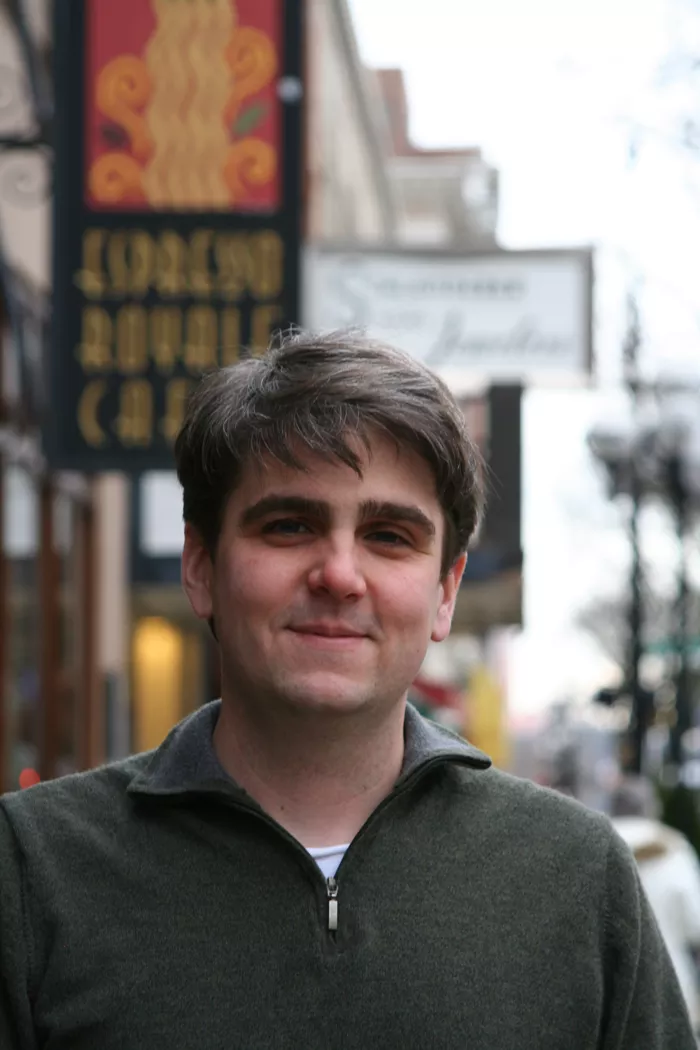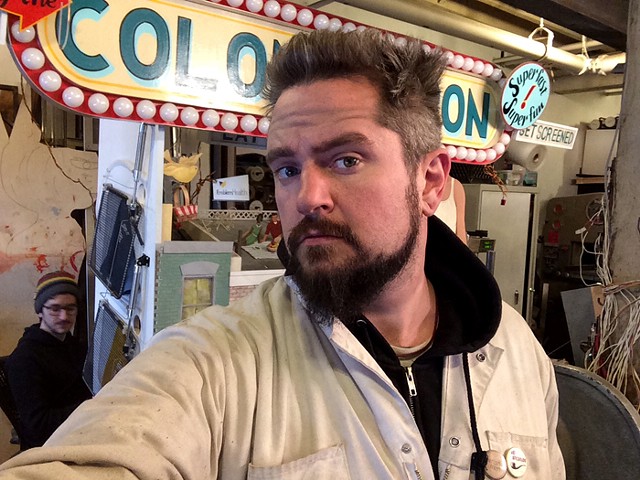Sean Mann has seen plenty of different environments. He grew up in suburban Livonia, attended college in small-town Kalamazoo, and lived abroad in the United Kingdom after graduation, before moving back to Detroit. He is a resident of the city’s Hubbard Farms neighborhood on the southwest side, where he’s active in the neighborhood. He’s best known as the creator of the Detroit City Futbol League.
MT: What would be your advice for those moving into Detroit?
Sean Mann: I guess I have some questions about the phrasing. Are we talking to the person moving to Detroit who has aspirations of “saving the city” or being super-involved, or are we just talking about the person who’s like, “It seems there are cool things going on in the city and I want to be there”?
MT: You think there are two kinds?
Mann: I sure hope so. [laughs] I mean, it’d be really dreadful if everybody who moved to the city was coming here out of some complex to save it. I don’t think that’s the city I’d want to be in. I think what we forget as a city is that we are a city. Cities are very dynamic places that attract a whole bunch of different people with a whole bunch of motivations. I think I know the aspiring Detroiter you’re talking about, though. What I would say to anybody moving into the city is that you don’t have to start a project to save the city. If your wheelhouse is staying in and watching Law and Order, you are totally entitled to do that. You shouldn’t feel guilty about not starting a block club or not planting trees every Saturday, or being part of any greater good in the city. Cities are dynamic places and should cater to all kinds of different people with all kinds of different interests. Not everybody can be a leader in the city. We have to have a place for followers. And for people who don’t want to be involved but want to enjoy the amenities that are associated with city life, whether that’s walkability or just seeing different faces on the street or whatever.
MT: It seems you come into contact with a lot of people who want to — I don’t know if “save” is the right word — help the city? Is there a best way to go about doing that?
Mann: I think this is an exciting time in the city. For better or worse, Detroit is that once-in-a-generation city that can define a time period. So I think there’s an appeal to being here and being involved. If that’s part of the reason you’re going to be here, then I think you should go into it with your head up and being aware. For instance, whatever great idea you may have, Detroit’s been in this kind of state of decline for 60 years now, so somebody’s probably started a project similar to what you aspire to do. I would probably lay low for a little while, do a little research, see the lay of the land, see what’s been done already in the city, talk to people who’ve been here longer, and see where you would fit in. I think, a lot of the time, there’s something already going on in the city you could tap into.
MT: Right. You don’t want to come to town and start a redundant group. You could alienate the people you might be working with?
Mann: Yeah, very much so. I think coming to the city and not being aware of what’s been done and trying to do it yourself could be seen as belittling the work that others have been doing for generations before. That’s not to say that what’s been done already can’t be improved upon. I think there can be an insular groupthink that goes on in all aspects of Detroit. I think we can be quite insular and we make ourselves more provincial than we need to be. But, that being said, a lot of very smart, earnest, hardworking people have been rolling up their sleeves for quite a while trying to make a difference, and so I’d tell the 22-year-old who just graduated from a state university with aspirations of “turning around Detroit,” like, before you start raising money on Kickstarter or anything like that before you even come to town, be here for a little while and get an understanding of what’s going on and who’s already here and where you fit in.
MT: What’s the ideal mix? When new people bring their energy to the city, what is the best way for that to work for everyone? What’s your dream scenario?
Mann: I can only lean on my own personal experiences in my own neighborhood, but we tried to resurrect our old Hubbard Farms neighborhood association, and the fact is that 20 years ago we had a neighborhood association. It petered out, I think, as that generation aged, and, among the new folks who’ve moved to the neighborhood, we’ve made an earnest, genuine effort to incorporate those older residents who were involved in that original incarnation of the association, to get their expertise, and, in a practical sense, they still have the old bylaws and LLC documents, as well as practical knowledge of why the past association struggled. And, you know what? They’ve been some of the people pushing the association along more than us younger folks, because we can certainly get distracted, and the older folks, I think, have been energized by us thirtysomethings. It’s not mandatory, but it makes things more successful if you have a wider breadth of people involved representing different perspectives.
MT: What else should young people moving into the city know?
Mann: There are a few things you should be aware of. One, some of the biggest haters or skeptics of whatever you’re proposing are probably people who just moved to the city a couple years before you got there. I don’t know how to explain that, it’s just something I’ve seen. Also, this is probably for the best, but the golden days of you just being young, white, educated and moving to the city with an idea and warranting, like, a Sunday feature in the Free Press … are over. The fact that you’re living here is not newsworthy anymore, so the limelight might be a little harder to grasp these days. And for any effort you’re doing, you should engage the folks who are already here, if only to improve your likelihood of success.
MT: Right
Mann: But you could do a guide for old Detroiters. Because the flip side is, how do longtime Detroiters handle the young folks moving into the neighborhood? If you’re a longtime Detroiter, unless you’re a loan officer, nobody needs your permission to open up a business or buy a house in your community. Cities are places of constant change and flux, and if people are coming in with great aspirations, it’s on them to put out the effort and reach out to you. But by no means are there any legal obligations to do that. It isn’t mandated in any kind of way. It’s on the people coming in to engage longtime Detroiters, but they don’t have to. They should, and if they don’t, it’s on them, but it’s no reason to dismiss or shoot down anybody’s aspirations. Again, I think cities are places that are in constant flux, and to think that they’re going to stay the way they are perpetually is going against the history of American cities in general. Over time, new people, new faces, are going to show up in your community, and local residents should acknowledge that, and figure out how they want to handle that. So if you come with an instant perspective of isolating them, not being welcoming, being dismissive of their efforts, that’s part of the equation that divides the resulting communities. It’s not a one-way street by any means, and it’s also on the people coming into the community to be cognizant of the people, efforts and initiatives already going on in the community. Older Detroiters don’t really have a say in what a new small business is going to do. But how are you going to adapt to that? Which role are you going to play? Are you going to be welcoming or have a cold shoulder? What role are you going to play in that neighborhood’s future? It goes both ways. It’s a two-way street.
MT: But it starts with communication.
Mann: Totally. It’s naive to think you could move into a neighborhood, not even have a physical presence in that neighborhood, thinking that, “I was just looking on Google Maps and this neighborhood needs more trees,” you know [laughs], and not being aware of what’s happening there. You have to be on the ground when you come in, and at least have an open ear.






